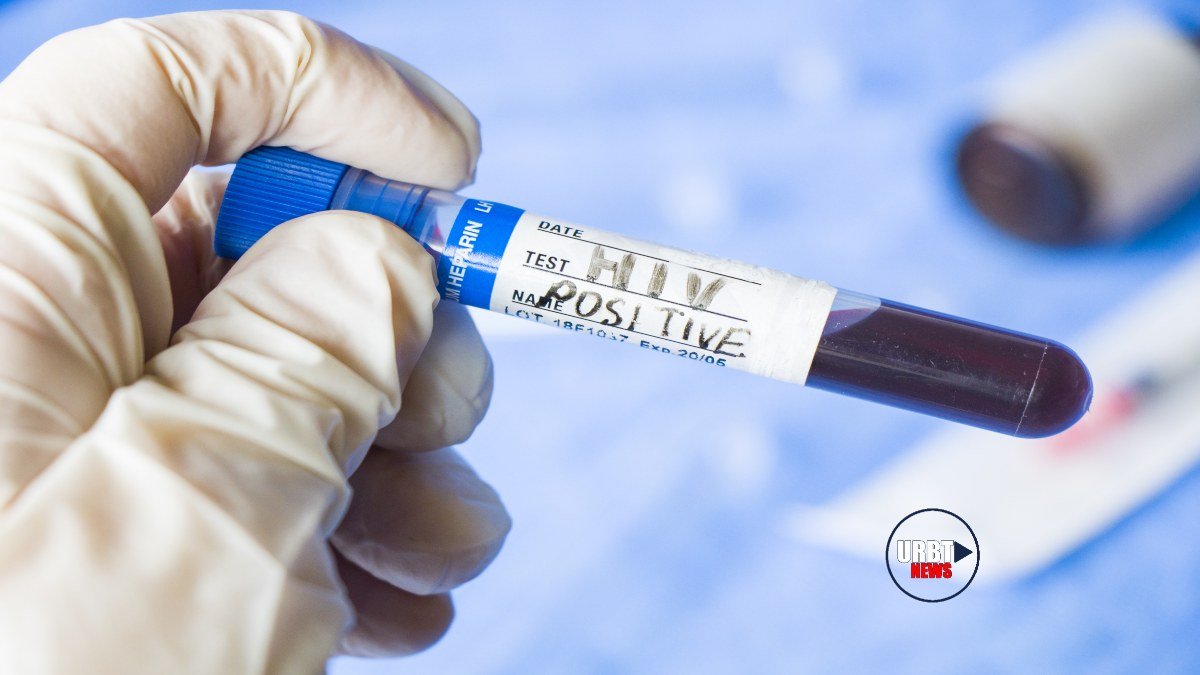
HIV/AIDS Leaders Gathered on Capitol Hill to #SaveHIVFunding
Community News
HIV/AIDS Leaders Gathered on Capitol Hill to #SaveHIVFunding
HIV/AIDS Leaders gathered on Capitol Hill to #SaveHIVFunding
Published
2 years agoon

HIV/AIDS Leaders Gathered on Capitol Hill to #SaveHIVFunding. This summer, the House Appropriations subcommittee, chaired by US Senator Tammy Baldwin (D-WI), passed a spending bill. If passed by Congress and signed by the president, the bill would cut $767 million from HIV funding. The cut in the 2024 United States budget and abroad in the 2024 budget, while global HIV funding remains threatened!
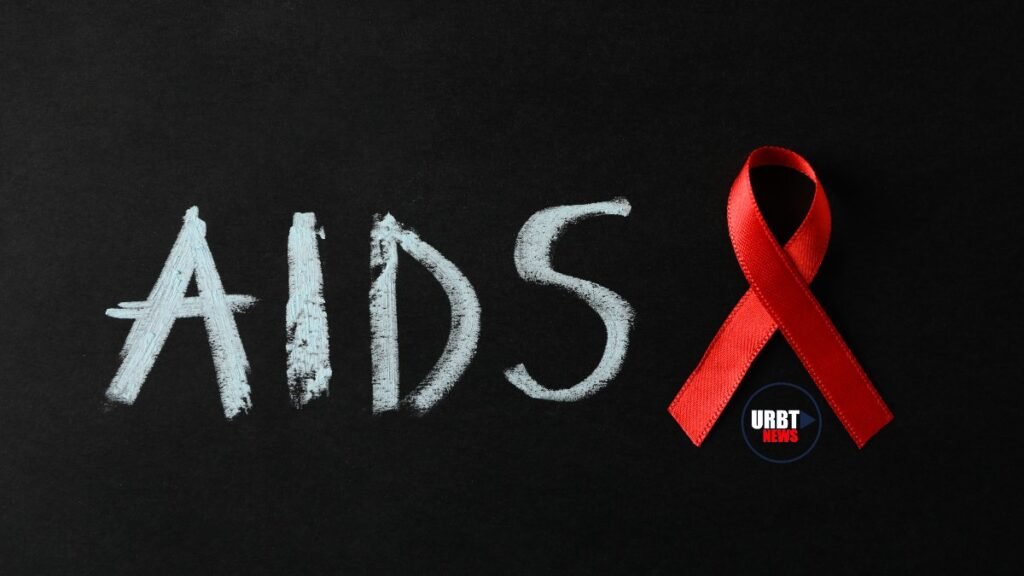
House Appropriations Subcommittee Spending Bill
Key points and highlights of the bill include $616 million for the Ending HIV Epidemic Initiative (EHE). This is a $3 million increase. It provides high-need jurisdictions with prevention and treatment services for people at high risk for HIV transmission. This includes $223 million within the Centers for Disease Control and Prevention’s (CDC) Domestic HIV/AIDS Prevention and Research programs. The funds would help develop and deploy innovative data management solutions. Additionally, the fund would increase access to PrEP, and better detect and respond to HIV clusters. The bill also protects funding for reproductive health programs such as Title X and the Teen Pregnancy Prevention Program.
Proposed HIV Funding Cuts
However, the bill would cut funding for numerous HIV programs. Moreover, it would also eliminate the Ending the HIV Epidemic initiative (EHE) passed by President Donald Trump in 2019.
The House has proposed over $767M in cuts to domestic HIV programs. It also calls for eliminating funding specifically designated for the Ending the HIV Epidemic initiative. At the same time, global HIV funding is also in jeopardy. Advocates have been successful in shoring up bipartisan support in the Senate to oppose domestic cuts. However, it is vital that HIV programs continue to unite. Moreover, they must insist that any proposal to slash global or domestic HIV funding is categorically unacceptable.
The initiative aims to reduce new HIV cases by 75% by 2025 a.nd 90% by 2030. The initiative focuses primarily on the 57 counties, states, and cities that account for 50% of new HIV cases.
Senate appropriators introduced a spending bill that keeps funding for domestic HIV programs in place. This occurred shortly after the House Appropriations subcommittee passed its bill. Democrats and Republicans must still negotiate the budget for the upcoming fiscal year. HIV advocates are concerned about the efforts to cut funding, however.
“Given that the House version of the bill includes sizeable funding cuts, program eliminations and divisive policy riders, we realize passage of [the Senate] spending bill is far from reality,” said Carl Schmid, executive director of the HIV+Hepatitis Policy Institute, when the bills were passed in July. “Republicans must come to the table and support bills, such as this one, that can pass the Congress and be signed by the president.”
PEPFAR Funding Threatened
This summer, Republican anti-abortion activists threatened to halt funding for PEPFAR, President George W. Bush’s global AIDS program launched in 2003. In its current form, PEPFAR has saved 25 million lives.
The United States increased its funding for PEPFAR from $1.9 billion in FY 2004 to $6.9 billion in FY 2023. Bilateral HIV efforts received $4.8 billion. Multilateral efforts received $2.05 billion of the funding. $50 million is for UNAIDS and $2.0 billion for the Global Fund). Totals represent funding specified by Congress in annual appropriations bills. They also include funding identified by agencies for the Department of State and USAID. The Centers for Disease Control (CDC), and Department of Defense (DoD) were also identified. Furthermore, the NIH Office of AIDS Research (OAR) international HIV supports research activities through its annual appropriated budget. PEPFAR does not include these funds.
In FY 2024, the President requested $6.8 billion for PEPFAR
“While advocates have been successful in shoring up bipartisan support in the Senate to oppose domestic cuts, it is vital that we continue to unite and insist that any proposal to slash global or domestic HIV funding is categorically unacceptable,” said PrEP4All of the need for the press conference at the Capitol.
We’re Not Gonna Take It
As I stood there awaiting the start of the #SaveHIVFunding press conference, “We’re Not Gonna Take it” by American rock band Twisted Sister blared over the PA system.
The lyrics include the battle cry,
We’re not gonna take it. No, we ain’t gonna take it. We’re not gonna take it anymore. We’ve got the right to choose, and there ain’t no way we’ll lose it. This is our life, this is our song. We’ll fight the powers that be, just don’t pick on our destiny, ’cause you don’t know us, you don’t belong.
#SaveHIVFunding Press Conference
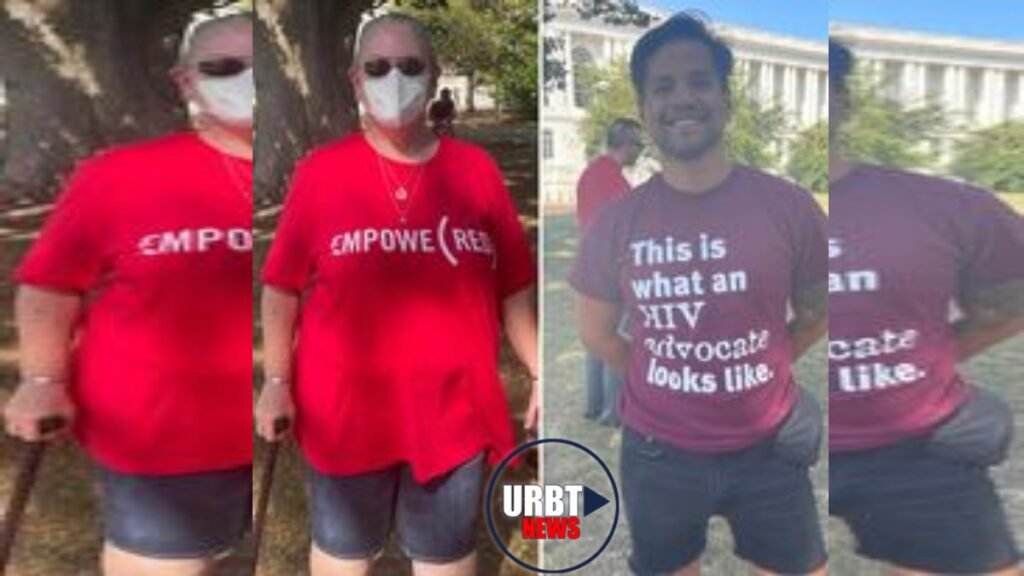
Picture: Advocates at the #SaveHIVFunding press conference pose separately in shirt HIV-themed t-shirts. PHOTO: COURTESY OF: File. Dated September 5, 2023.
Millions of lives are at stake while Congress bickers on whether to extend PEPFAR for one year or five years. Congress is playing politics with people’s lives, and we as a society should never, ever play politics with people’s lives.
Advocates urged members of Congress to support and expand upon the FY2024 domestic HIV funding levels proposed by the bipartisan Senate LHHS appropriations subcommittee. The also called for Congress to pass a clean, five-year reauthorization of the President’s Emergency plan for AIDS Relief. Commonly known as PEPFAR, it serves as a bedrock for US global HIV/AIDS support.
“Arbitrarily dismantling domestic and global HIV funding is not only cruel; it is costly to the US,” stated Jeremiah Johnson. Executive Director of PrEP4All, Johnson added, “Domestic HIV funding is a smart investment.” “Every new case of HIV in the US leads to over $500,000 in lifetime healthcare costs.”
Additionally, “These are incredibly successful programs that are saving lives and saving costs by averting new infections,” said Johnson.
He went on make the point that “Throwing all of that away to make short term, nonstrategic, misguided political points about government spending or partisan politics would needlessly undercut long standing, bipartisan public health victories.”
“Due to the federal commitment to combatting the HIV epidemic over the last 40 years, we now have the tools to end the HIV epidemic,” stated Congresswoman Barbara Lee in a statement drafted for the press conference. “This is the moment when Congress must double down on its efforts and find the political will to increase the national and international HIV/AIDS response. We must step up our commitment to fund research, and direct services to truly end the HIV epidemic,” the statement continued.
HIV Advocates Speak Up

Picture: #SaveHIVFunding movement press conference on US Capitol grounds. They are fighting to protect HIV health services and programs in the House FY2024 spending package. PHOTO: COURTESY OF: File. Dated September 5, 2023.
Malcom Reid, Chair of the Policy Action Committee for the U.S. PLHIV Caucus , exclaimed, “These cuts will kill people!” He continued, “Now is not the time to take our foot off the gas. We are making significant progress in testing, diagnosing, treating and preventing HIV.”
Pauline Muchina, a speaker from the Advocacy Network of Africa, stated, “If PEPFAR isn’t reauthorized, we could lose millions of people who rely on PEPFAR for life saving medication, including my adopted children.” She continued, “We would also see rising HIV infections caused by the elimination of prevention programs, including babies born with HIV, because prevention of mother to child transmission (PMTCT) initiatives are discontinued.”
“The CDC estimates 91% of Black Americans who need PrEP aren’t getting it”, explained Raniyah Copeland, Founder of Equity & Impact Solutions. She continued by saying, “We need to continue to blaze forward to end this disease that has ravaged our world for more than 40 years.”
“Now is the time to strengthen rather than weaken our response to the HIV pandemic,” wrote Michelle Cespedes, MD, MS, Chair of the HIV Medicine Association in a separate statement. Cespedes’ statement continued, “Withdrawing much needed support for public health, biomedical research, HIV prevention and healthcare programs, will put our nation’s health and health security at risk and reverse critical gains made in responding to the HIV pandemic.”
“When we’ve come so far in our efforts to end HIV, we can’t turn back progress, especially when it means we will continued to leave Black people behind,” exclaimed Copeland.
According to Charles King with Housing Works in New York, “The House proposal would guarantee that the HIV epidemic will continue to a long time.” Adding, “The proposed bill is driven by racism and a total disregard for the lives of people who use drugs.”
#SaveHIVFunding Advocates Issue Call to Action
“Members of Congress must not use the bipartisan PEPFAR program to play politics while worsening the epidemic throughout the world, including in the US, risking the health of millions and condemning millions to death,” read Muchina’s statement.
Rethink your faith if it tells you to put politics over humanity. Reid added, “You cannot be pro-life and cut HIV fund.” You’re not pro-life if you’re going to let millions of people die. If you’re pro-life, then be pro-life. “Cutting funds shortens lifespans,” stated Reid. Do not cut people’s lives short.
“We can end HIV, but we can’t let this opportunity fall into bipartisan fighting. We need HIV funding from Congress NOW,” added Copeland.
“HIVMA calls on Congress to sustain and grow investments in global and domestic HIV programs. These must include PEPFAR, all parts of the Ryan White HIV/AIDS Program, the Ending the HIV Epidemic initiative, and infectious diseases research at the National Institute of Health,” read Cespedes’ statement.
Takeaways: #SaveHIVFunding Press Conference
This is a story of hope. A story of bipartisanship.
Over 130 HIV prevention advocacy groups and HIV activists convened at the US Capitol building grounds on Tuesday, September 5. They gather for a press conference to #SaveHIVFunding and denounced proposed cuts to HIV budgets both nationally and abroad.
The 4 p.m. event featured HIV leaders from a variety of organizations, including the Southern AIDS Coalition, NMAC, Housing Works, AVAC, the U.S. People Living With HIV Caucus, the HIV Medicine Association, the Advocacy Network for Africa, and Equity & Impact Solutions. As part of #SaveHIVFunding, PrEP4All and a coalition of HIV advocacy and nonprofit organizations spearheaded the initiative.
The #SaveHIVFunding movement is fighting to protect HIV health services and programs in the House FY2024 spending package. #SaveHIVFunding declared, “We will be heard and these funds will be protected.”
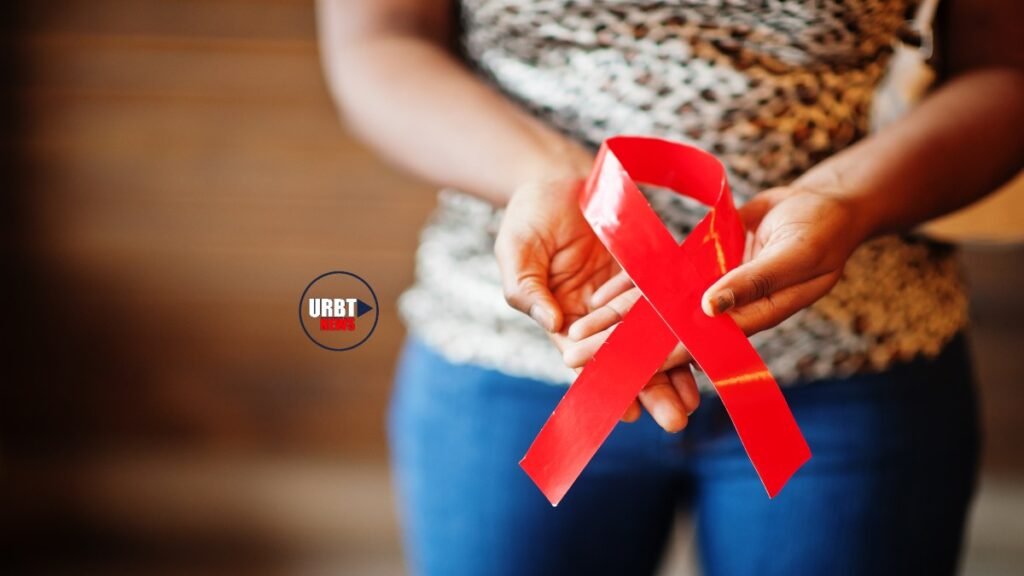
The press conference took place as thousands of HIV advocates, researchers, and allies gathered in Washington, DC for the annual U.S. Conference on HIV/AIDS (USCHA) from September 5 to 9.
In addition to organizing a press conference to raise awareness about HIV funding, over 130 executive directors of leading HIV organizations signed a letter to Congress. “We write to request your support in a time of unprecedented concern for our movement,” states the letter. “Specifically, we are asking you to do whatever you can to support the HIV funding levels and report language proposed by the Senate LHHS [Labor, Health and Human Services, Education and Related Agencies] appropriations subcommittee for FY24 and a clean, five-year PEPFAR reauthorization [referring to the global U.S. President’s Emergency AIDS Relief program].”
Contacting Your Congressional Representative
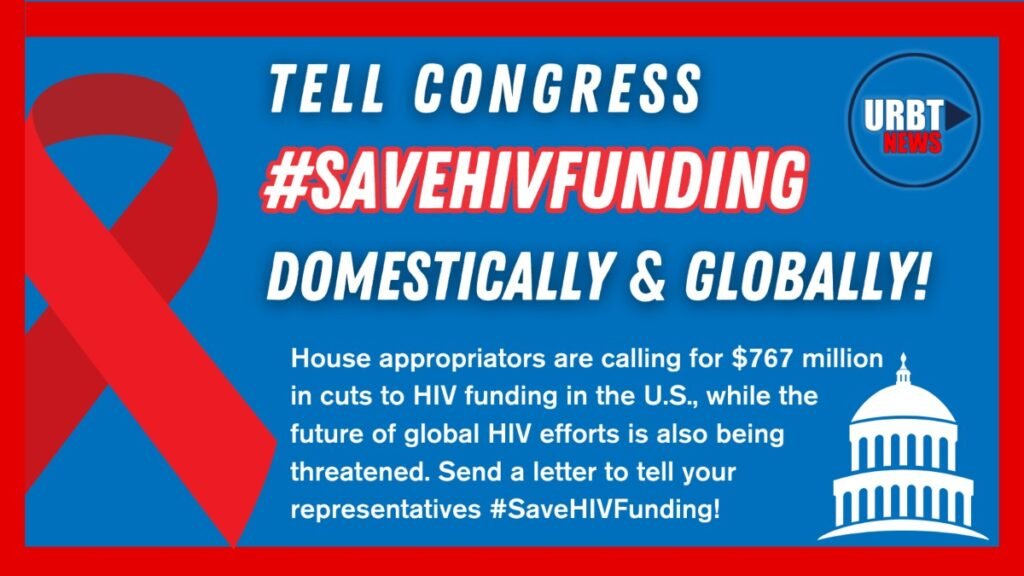
Congress must fully fund our domestic and global anti-HIV efforts. PrEP4All and the #SaveHIVFunding movement are asking the public to use this form to contact your members of Congress right now!
Related URBT News article: 2023 USCHA: A Love Letter to Black Women
DOWNLOAD THE URBT NEWS APP HIV/AIDS Leaders Gathered on Capitol Hill to #SaveHIVFunding
You may like
-


Single Men & Step-Fatherhood: Crucial Considerations Before Taking the Plunge
-


Jesse Jackson Dies at 84: Civil Rights Icon’s Legacy
-


Minority Births Surpass White Births: A Demographic Shift Impacting America
-


Hot Girl Summer: Your Guide to Confidence, Fun, and Intentional Living
-


Shrek as a Cautionary Tale: Unmasking the Ogre’s Life Lessons
-


Test Your Spelling Skills: How Good Are You Without Technology?


